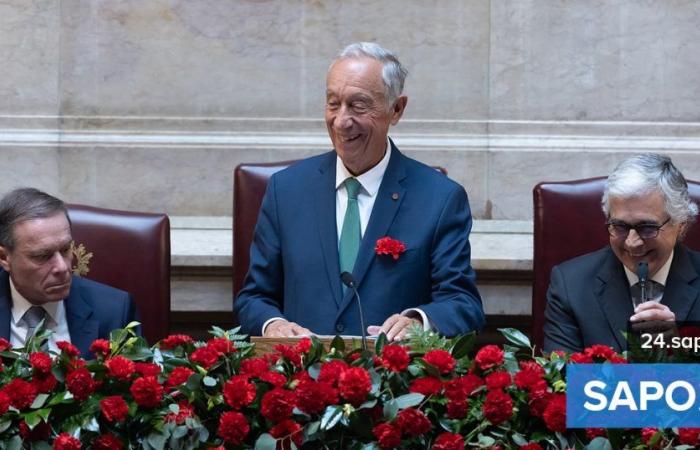“Let us have the humility and intelligence to always prefer democracy, even imperfect, to dictatorship”, stated Marcelo Rebelo de Sousa, in the solemn session commemorating the 50th anniversary of the 25th of April in the Assembly of the Republic.
The head of state considered that many advances achieved in these five decades are “in need of the impetus of new generations, ideas and people”, before the 25th of April “remains or ends up becoming nostalgic, nostalgic, more past than future” .
“What to do, how to do it? Take what is strongest, most lasting, most redeeming, most promising in April, and with that, recreate Portugal. This unique, singular value, which never died, never erased, never weakened : it is called freedom, democracy and the will of the people. So let us recognize this vital force of democracy”, he appealed.
Marcelo Rebelo de Sousa argued that “democracies, even unfinished ones, are the strongest and most creative societies in the world, as they are the best humanly, as they are the most environmentally advanced, as they are the freest, most plural, most open, least repressive, less persecutory, less intolerant, less averse to differences”.
Democracies are “more open to everyone, even everyone, including those who contest, in whole or in part, that democracy”, he added.
“Nobody wants to exchange a less perfect democracy for a dictatorship, even if seductive or hidden behind illiberal tics. We in Portugal don’t want to. What we want is greater economic, social and cultural quality, to give strength to better political quality”, he reinforced.
The head of state began his speech by recalling his time as a constituent deputy “in his early 20s”, between 1975 and 1976.
“It seems like it was yesterday, or the day before yesterday, but it wasn’t, it was half a century ago. Today I found myself seeing myself 48 years ago, sitting in this hemicycle, in the Constituent Assembly”, he said.
“I don’t find many more of this time in this room. It’s the law of life”, he observed.
At the end of his speech, he went back to “an older memory”, from the period of the dictatorship, when he was in the then National Assembly, “at the end of the 60s, sitting in the third row of the gallery – ironically behind the future bench of 76 – accompanied by fellow university students, looking at those who were speaking”.
The deputies were “all of them chosen one by one by one person, and only that person, leader for life or leader without term of the unassumed single party, arrived here by the will of the leader, not by the will of the people”, he said.
“A hemicycle so different, so opposite to that of 76, of the last 50 years, of today. A hemicycle of popular choice would be impossible to find, in 35, in 45, in 55, in 65, on 24 April 74 “, he highlighted.
“Definitely the path we want is not this, that of dictatorship, but that of ever better, much better democracy, for the future of Portugal”, concluded Marcelo Rebelo de Sousa, exclaiming: “Long live the 25th of April, long live freedom, long live democracy, long live Portugal”.
Marcelo argues that nothing compares to the Carnation Revolution and remembers the protagonists of democracy
The President of the Republic defended today that nothing in contemporary history compares to April 25, 1974, due to the changes it entailed, in a speech in which he recalled the protagonists of Portuguese democracy over the last five decades.
“Therefore, it is unfair to compare the incomparable, and forget the global costs of what we experienced, and even the costs of the revolution, which only existed because the dictatorship did not know how or did not want to make a transition, unlike neighboring Spain”, considered Marcelo Rebelo de Sousa.
In his speech, which lasted close to half an hour, the head of state mentioned, although without naming them, Ramalho Eanes, Mário Soares, Francisco Sá Carneiro, Álvaro Cunhal, Freitas do Amaral and Cavaco Silva, among others, when speaking about the background of the Carnation Revolution and the stabilization of the democratic regime.
Each name evoked different applause, sometimes more to the right and sometimes more to the left, in the Sala das Sessões, where the former heads of State António Ramalho Eanes and Aníbal Cavaco Silva were present in one of the galleries.
“Many, many others like them fought and won so many times. And others fought and lost, a little or a lot. And some became disillusioned, on the 25th of April, others on the 28th of September, others on the 11th of March, others in the hot summer, others on the crucial 25th of November, which ended up defining the outcome of the revolution”, and still “others over the last 50 years”, he said.
At this point in his intervention, Marcelo Rebelo de Sousa highlighted that the 25th of November 1975 “rightfully, like the Constituent Assembly and the Constitution, was always intended to be part of the April celebrations, which will only end in 2026”.
“Like history, it is often made and remade more from lows than from highs”, he observed.
Then, the President of the Republic asked: “And will these ups and downs be comparable to any other military or social political movement in our contemporary history, in the history of our oldest European partners or our most recent European partners?”
“No, there is no comparison. The 25th of April entailed at the same time the end of a five-century-old empire, the end of a five-decade dictatorship, economic and political integration in today’s European Union and four changes of economic regime”, he argued.
According to Marcelo Rebelo de Sousa, “no other revolution or military coup was comparable” in contemporary history, because “no other modern European empire faced all these challenges at the same time in less than 30 or 40 years”.
“None of our Eastern partners had had extra-European empires or experienced decolonization, democratization, European integration and four changes of economic regime like us. Therefore, it is unfair to compare the incomparable”, he argued.
Tags: Marcelo humility intelligence prefer democracy Current Affairs
--





